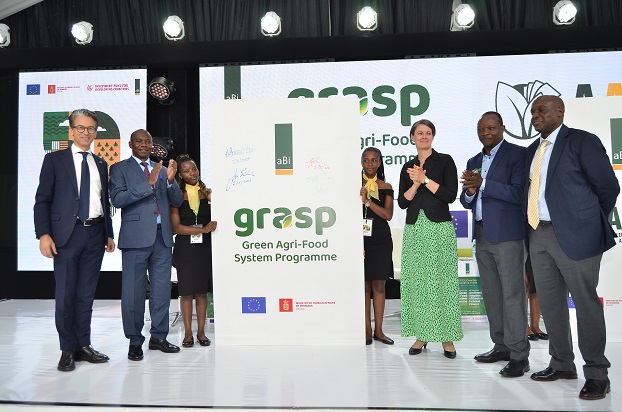First Lady and Education Minister, Janet Museveni displays the containers which parents should use to pack for their children food. Photo Nicholas Bamulanzeki/ The Observer
The recent government pronouncement prohibiting the cooking of meals in schools has not gone down well with parents and educationists.
A special cabinet meeting on Friday last week banned schools from providing meals for learners and tasked learners in public schools to carry lunch boxes from home.
The State Minister in Charge of Primary Education, Joyce Kaducu, said that the decision is aimed at preventing schools from collecting money from parents.
However, Filbert Baguma, the Secretary-General of the Uganda National Teachers’ Union, says that the government is out of touch with reality as this blanket policy cannot be the best feeding option for learners throughout the country.
Baguma explains that although the issue of school feeding has been a contentious topic, the government has failed to resolve it as they continue to politicize it instead of conducting comprehensive research among parents, schools, and communities.
Teopista Birungi Mayanja, an Educationist and well-known advocate for free education is also critical of the government’s decision.
While she acknowledges that the provision of lunch is primarily the responsibility of parents, she notes that this policy should be considered in the context of each school environment.
Mayanja, who is also a commissioner at the International Commission on Financing Global Education Opportunities, explains that the government’s proposal might be effective in some schools and rigid in others.
She says the decision on how to feed children should be left to the parents and schools to decide based on their respective circumstances.
According to the Education Act of 2008, the responsibility of feeding learners rests primarily on the shoulders of parents and communities.
Baguma suggests that the decision-making process on how to provide this food should be left to the parents and schools, rather than being imposed on them.
Charles Rwakairu, a resident of Wobulenzi town council describes the government’s proposal as a “stone age” idea that will create discrimination among learners.
Rwakairu says learners from well-off families will be able to bring expensive meals, while others may not even have anything to bring due to the fact that many households only have one meal and may not have excess food to pack in the morning.
Fred Bbosa, another parent believes that paying for lunch is a better and more affordable option for school feeding. He argues that buying food on a daily basis might be expensive and difficult to sustain since parents may sometimes fail to provide money or food for a particular day, resulting in learners spending a day without a meal.
Both parents suggest that the government should develop a national school feeding program that ensures that all learners receive the same meal at school. This feeding proposal is also highlighted in the National Resistance Movement (NRM) manifesto for 2021 to 2026, in which President Museveni pledged to introduce a feeding program once he is re-elected.
Many headteachers and teachers in public schools declined to comment on the matter fearing potential repercussions from the authorities.
However, one headteacher in Wakiso district told our reporter anonymously that she believes that a common hot meal prepared at school, is a better way of feeding children, although the issue of how to achieve this needs to be debated.
“A daily school meal is a vital incentive to keep children in school, and it allows them to concentrate on their studies. Packing food means that many learners will end up eating cold food at lunchtime. I am not a medical doctor, but this might have issues. The packaging is also another issue. We all grew up packing food, and we know the experience,” said the headteacher.
The headteacher also noted that school feeding programs are crucial in keeping learners in schools, particularly in low-income families. This is consistent with the findings of the State of School Feeding report published by the World Food Programme.
The report highlighted that a free school meal is an incentive for parents to keep their children in school, especially girls who are often the first to be pulled out of school due to financial constraints. According to the 2014 National Population and Housing Census report, 66 percent of primary-level learners did not receive school meals, with urban children (41%) being more likely to receive meals than their rural counterparts (32%).
The government has recommended and promoted home-packed meals as the school feeding modality, especially for rural schools where 80% of the estimated 7.9 million primary learners are registered. In 2018, a photo of education minister Janet Kataha Museveni holding a lunch box urging parents to use such boxes for their children went viral. The minister, saddened by the problem, launched a countrywide campaign aimed at sensitizing parents on their role and the importance of feeding children nutritious foods.
However, a paper issued by the Finance Ministry in May 2019 showed that home-packed meals had minimal success due to factors such as a lack of food and packing materials at the household level, as well as a low appreciation of the links between meals and learning outcomes by various responsible parties. Equally, the National Planning Authority’s 2020 comprehensive Evaluation of the UPE Programme also noted that parents have neglected their duty of feeding their children, with many thinking that it was the government’s role to feed their children.
The NPA blamed this on the long-time absence of clarity on the matter, which aggravated the problem of parental negligence. The authority recommended a needs-based approach in regions where households have genuinely failed to feed their children in school.
-URN





